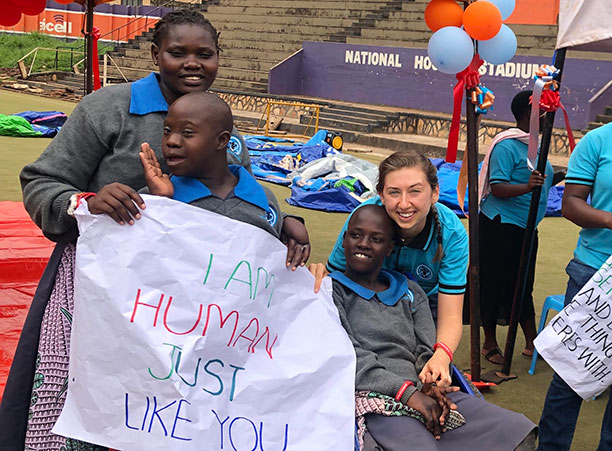
In her junior year, Delaney Wells '20 interned in the Disability Rights section of the Department of Justice during the Washington Semester Program. There, the religious studies major with a concentration in peace and conflict studies learned about a group called EmbraceKulture, a nonprofit organization working to destigmatize disability in Uganda. With assistance from the Ignite Fund and through the Weiss Summer Research Program, Wells spent 10 weeks in Entebbe, Uganda this past summer conducting ethnographic research. This fall, Wells presented her research in a discussion sponsored through the J.D. Power Center for Liberal Arts in the World. We caught up with Wells to learn about her passion for advocacy and to see what insight she's brought back to The Hill.
Where did your interest in disability advocacy come from?
My mom is a speech and language pathologist, so growing up, my family valued inclusion. Once I came to Holy Cross, I became involved in Spring Break Immersion, particularly with the L'Arche organization, where people with and without disabilities live together through a model of mutuality in community. From there, I spent a semester in Washington, D.C., interning in the Disability Rights Section of the Department of Justice and spending a lot of time at a local L'Arche community in Arlington, Virginia. Those experiences really grounded me in the idea of reciprocal relationships and the importance of the inherent dignity of a person, which inspired me to find an international context to have a different experience.
Tell us about your work in Uganda — where did you live and who or what moved you?
I spent my time at the EmbraceKulture Amaanyi Center, the first school for kids with disabilities in Uganda. I lived at the school and was in the classroom with 14 students basically all day, from 8:00 a.m. to 6:00 p.m. We did language arts class and math class; we also had a granola-making class, where we would sell granola in the community as a way to build social and business skills.
I was particularly close to a student named Ketty. When she was born, her father wanted to throw her away, literally, either in the dump or pit toilet. Her mother refused, so her father left. Years later her home community, Sororti, was experiencing a drought. The village blamed the drought on "the cursed child" and devised a plan to have her sacrificed. Her mother heard of the plan and, in the middle of the night, fled with Ketty to a local pastor. That pastor brought her to the EmbraceKulture Amaanyi Center. They spent over a year doing sensitization in her village so she could return and reintegrate without fear. That’s why it was a huge deal when they not only accepted but celebrated her in the village.
Where did your research lead you?
I was studying the stigmatization of disability within two different church communities in the village where I stayed. I really explored this relationship between traditional beliefs regarding disability — witchcraft, Satan and more that's been embedded in their belief system — and the evangelical Christian movement that has come about since the 1990s. I was curious about how this relationship between religion and traditional beliefs comes together through the stigmatization of disability, and particularly what this meant for the students of the EmbraceKulture Amaanyi Center.
How has your trip resonated on your return to Holy Cross?
Holy Cross has really taught me the importance of educating someone holistically and knowing that a lot of learning happens outside the classroom. My time in whatever community I've been lucky enough to share life with allows my academic experience to become so much deeper. I’ve been able to explore more about who I am, who I want to be in this world and especially how I want to live in relationship to other people.
Delaney Wells '20 Has a Global Dedication to Disability Rights
The senior spent her summer researching the stigmatization of disability in Ugandan churches


